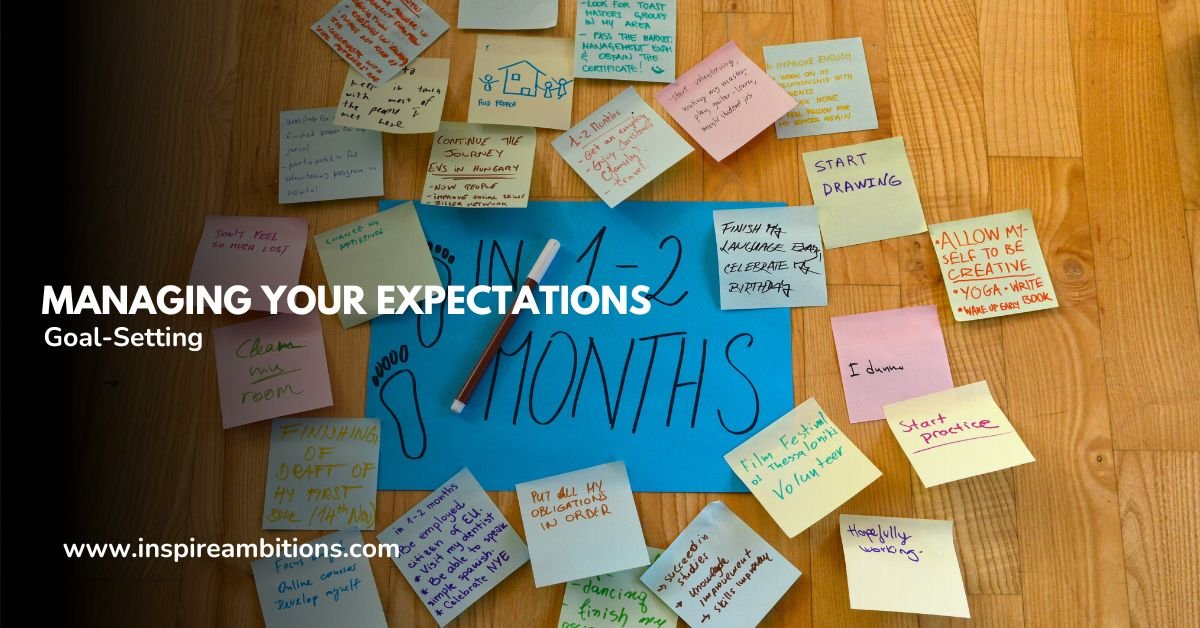Managing Your Expectations – A Guide to Realistic Goal-Setting
Managing Your Expectations: The Key to Contentment

Expectations can significantly influence your overall happiness and satisfaction in life. They shape how you view the world, your experiences, and the outcomes of your actions. It’s common for individuals to set the bar high, but ensuring realistic expectations is essential.
Balancing hopes with attainability is vital for maintaining a sense of achievement and avoiding consistent disappointments.
Realistic Goals: Finding the Sweet Spot
Learning to manage your expectations involves setting goals that are challenging yet achievable. This balance aids in cultivating a positive outlook as progress feels within reach and accomplishments become more frequent. Realistic aims also leave room for life’s unpredictability, allowing you to adapt and find satisfaction in outcomes you may not have initially imagined.
Happiness Through Expectation Management
When you effectively manage your expectations, you create a conducive environment for happiness to thrive. By understanding and accepting personal and external limitations, you can appreciate experiences as they come and reduce the pressure of perfection. Adapting expectations doesn’t mean lowering standards but embracing a flexible mindset conducive to personal growth and contentment.
Setting Realistic Expectations

Managing your expectations effectively can lead to increased joy and trust while minimising feelings of anger when outcomes don’t align with your hopes.
Understanding Expectations
Realistic expectations are essential to personal satisfaction and successful relationships. You should:
- Recognise the difference between hope and reliable forecasts.
- Acknowledge the influence of past experiences on your expectation setting.
Identifying Unrealistic Standards
Unrealistic expectations often lead to disappointment. Identifying these can:
- Alert you to when your aspirations may not align with reality.
- Help prevent disillusionment in various aspects of your life.
Family and relationships thrive on realistic expectations that foster:
- Trust: By setting attainable standards, you nurture reliability within relationships.
- Balance: By knowing where flexibility is feasible, you maintain harmony.
Goals and Success
Your goals and definitions of success should be tailored to your capabilities and context:
- Assess your skills and resources.
- Set milestones that are achievable and measurable.
Managing Expectations in Practice
Understanding how to set realistic expectations and navigating the gap between aspirations and reality is crucial. This practical approach entails employing strategies in the workplace, cultivating a personal mindset that’s ready for growth, and building resilience to cope with potential disappointment.
Workplace Strategies
- Create a plan: Articulate a clear vision and establish accurate expectations by setting quality metrics. Utilise tables to outline these metrics for clarity:
| Metric | Description | Target |
|---|---|---|
| Customer Satisfaction | Measure through feedback surveys. | Above 90% |
| Project Completion | Track the percentage of projects completed on time. | At least 80% |
- Foster Accountability: Managers should hold team members responsible for their roles while promoting a culture of compassion. Highlight examples of accountability, like timely decision-making and acknowledgement of mistakes.
- Embrace Flexibility: Recognise that obstacles will arise. Encourage a mindset that remains adaptable, aligning with the reality of workplace dynamics to combat burnout and maintain well-being.
Personal Growth and Perspective
- Adjust Your Level of Expectation: Align your aspirations with reality by striving for high standards without falling into the trap of perfection. This balance can mitigate stress and unhappiness.
- Practise Gratitude and Compassion: List aspects of your life and work you’re grateful for to maintain a positive outlook:
- Helpful colleagues.
- Personal health.
- Opportunities for career development.
- Cultivate Confidence: Confidence grows from recognising and celebrating even small achievements. This prevents frustration from clouding your judgment and helps maintain a clear perspective.
Building Resilience against Disappointment
- Anticipate and Accept Disappointments: Research and understand that setbacks are a part of growth. This foreknowledge aids in preparing for adverse outcomes and reduces the shock when they occur.
- Learn from Mistakes: Reflect on what went wrong and devise a plan to prevent future occurrences—table mistakes as learning opportunities, not failures.
- Control vs. Letting Go: Distinguish between what you can control, like your effort and attitude, and what you cannot, such as others’ decisions or market forces in a restaurant scenario. Let go of the latter to prevent undue stress.







